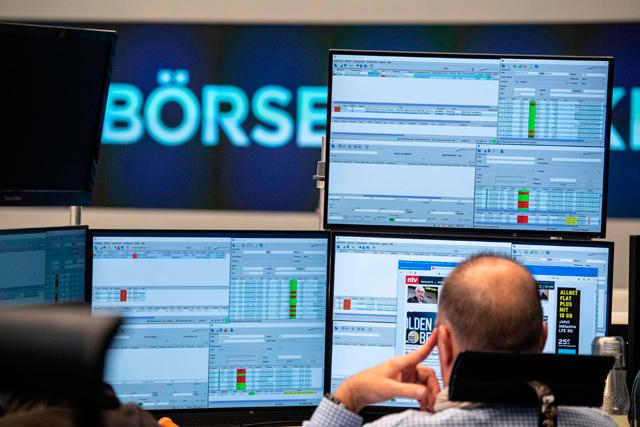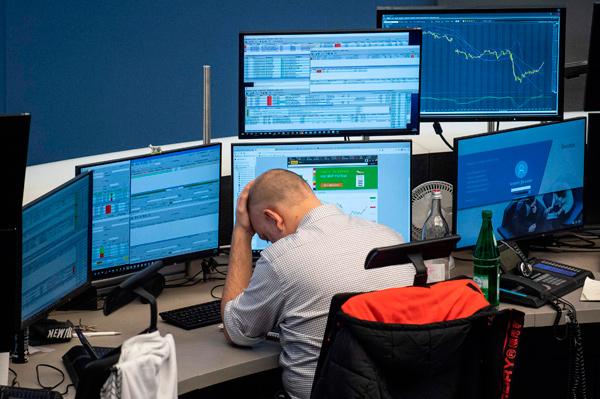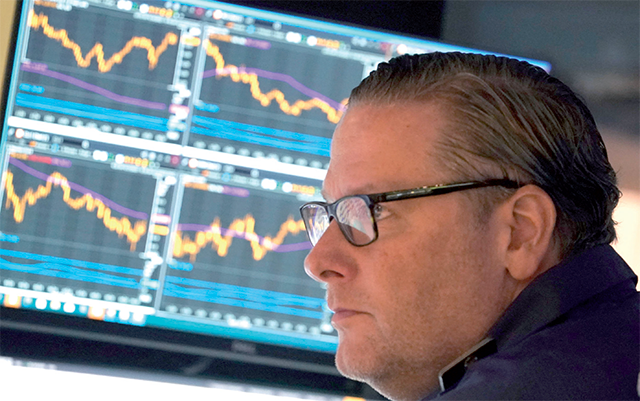You are here
Global stocks rebound as Iran fears ease, but traders on alert
By AFP - Jan 07,2020 - Last updated at Jan 07,2020

A trader works at the stock exchange in Frankfurt am Main, western Germany, on Monday (AFP photo)
LONDON — Equities rebounded while oil and safe-haven gold retreated on Tuesday as fears of a Middle East conflict abated, but investors remained on alert for any escalation after the US assassination of a top Iranian general.
With few major developments in the crisis sparked by the killing of Qassem Soleimani last week, traders were able to turn their attention back to the global economic outlook and the US-China trade deal signing planned for January 15.
Wall Street provided a positive lead, with all three main indexes reversing early losses to end in the green on Monday as traders welcomed strong service sector data from the US, Europe and Britain that provided hope that the worldwide growth slowdown was easing.
'Happier mood'
In European late morning deals, London stocks rose 0.1 per cent, Paris gained 0.6 per cent and Frankfurt climbed 1 per cent.
Asian markets were broadly higher, with Tokyo ending 1.6 per cent up, Hong Kong adding 0.3 per cent and Shanghai rising 0.7 per cent.
"Markets were in a happier mood on Tuesday as it looked like investors' fears had subsided over an escalation of tensions between the US and Iran," said Russ Mould, investment director at stockbroker AJ Bell.
"Stocks in Europe and Asia rallied, with supermarkets, tobacco and airlines among the sectors in demand on the London market."
Observers said the limited impact on markets was also because the stand-off was not expected to have a massive impact on global growth.
The shift back to riskier assets saw oil prices retreat, having rallied almost 7 per cent in the previous two days. Gold slipped from six-and-a-half-year highs.
"Putting to one side the heat and noise of the events of the last few days, and in the absence of further violence and escalations, the reality is that very little has changed," said CMC Market analyst Michael Hewson.
But analysts warned that the mood could change in a split second, with Donald Trump warning of a major retaliation if Iran carries out any revenge attacks.
'Wait-and-see mode'
"It's wait-and-see mode here," said Steve Chiavarone, at Federated Investors. "How much, if at all, do things escalate with Iran and does it ultimately impact the global economic outlook? Right now, not so much. Could it change? Sure."
The strike on such a high-profile member of the Iranian regime has also raised the question of when and how — not if — Tehran will retaliate, which experts say will likely continue to support crude.
"The US strike in Iraq last week offers up a speculator's delight on the belief that Iran will need to muster up a sufficient response to mobilise local nationalist support," said AxiTrader's Stephen Innes.
"But it's the great unknowns around what form of retaliation will transpire and the unlikelihood of de-escalation that should continue to support the higher risk premiums over the medium term."
He pointed out, however, that there was a lot of production capacity around the world, including US shale, which could prevent prices from soaring.
Related Articles
LONDON — Oil prices surged, gold hit a 6.5-year high and most equities tumbled on Monday after the US assassination last week of a top Irani
LONDON — Global stock markets were subdued on Tuesday on the eve of a monetary policy update from the US Federal Reserve (Fed) and ahead of
LONDON — Global stock markets retreated Wednesday as traders digested stubbornly high UK inflation and mulled central bank moves in the figh



















